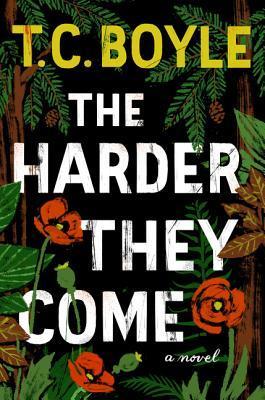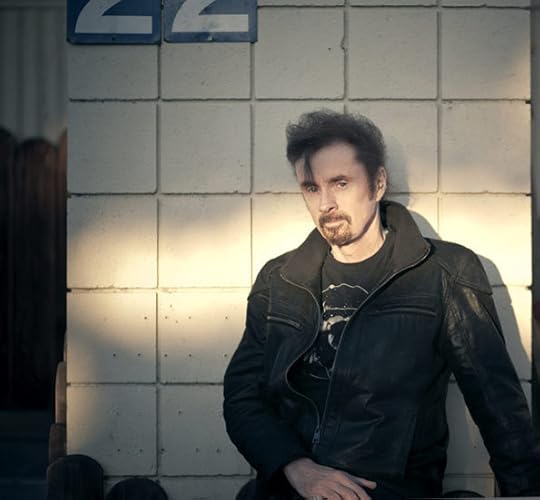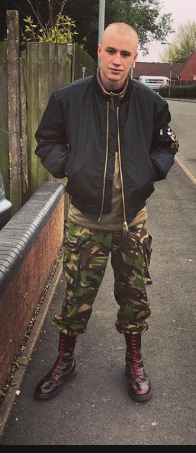What do you think?
Rate this book


384 pages, Paperback
First published March 30, 2015
Here was guilt. Here was the shit of the world coming home to roost right here in the redwoods.A part of the American mind has been off its meds for a very long time. There are some fine specimens of the syndrome tramping through the landscape in TC Boyle’s latest novel, The Harder They Come. Sara Hovart Jennings, 40, divorced, lives with her dog and her paranoia.
Was she wearing her seatbelt? No, she wasn’t, and she was never going to wear it either. Seatbelt laws were just another contrivance of the U.S. Illegitimate Government of America the corporate that had given up the gold standard back in 1933 and pledged its citizens as collateral so it could borrow and keep on borrowing. But she wasn’t a citizen of the U.S.I.G.A, she was a sovereign citizen, a U.S. national, born and raised, and she didn’t now and never would again acknowledge anybody’s illegitimate authority over her.She makes a living helping take care of horses and other animals on the northern California coast. Sara is more a garden-variety crank than a certifiable one.
There was talk on the radio, but it was mainly left-wing Communist crap-NPR, and how was it their signal was stronger than anybody else’s?Adam Stensen is more the latter sort, mid 20s, hitchhiking, late of a local institution for the very nervous. Sara picks him up. Adam has issues. His grasp on reality is less than firm. He calls himself Colter, for John Colter, of the Lewis and Clark Expedition, considered by many the first mountain man. The border between Adam’s reality as Adam and his reality as Colter is way too permeable.

He’d been up early all his life and though everybody said the best thing about retirement was sleeping in, he just couldn’t feature it. If he found himself in bed later than six, he felt like a degenerate, and he supposed he could thank his mother for that. And his father. The work ethic—once you had it, once it had been implanted in you, how could you shake it? Why would you want to?He and his wife, Carolee, were on a group tour in Costa Rica. The bus driver who drove them to a remote location may or may not have been in on it, but after getting off the bus the group is accosted by several armed men and robbed of their possessions. At least that was the plan. Sten, away from the group when the action begins, gets the drop on a gun-toting bandit and kills him. The other robbers flee. Sten returns home a hero.
The essential American soul is hard, isolate, stoic, and a killer. It has never yet melted.Boyle has been looking at that soul for a while. His vision of it remains interesting. It is not a pretty sight. In straight narrative sections he gives us an up close and personal look at the historical Colter contending with existential 19th century threats. America was a challenging environment, whether for its early residents enduring a European invasion or for explorers taking on the risk of encountering actual hostiles in parts of the continent that were not under European/American rule. Of course, like so much of history, American and other, the details can be lost over time while the idealized image remains. See, for example, Supreme Court justices basing decisions on mythical, lumped-together, founders, while the fact is that those founders were a contentious lot who disagreed about most things. History as fantasy is as rich a seam in the American lode as is violence. Adam has fixated on one such fantasy, glorifying hardship. As a result he cannot reconcile his image of the archetypal independent mountain man with the fact that Colter actually returned to civilization after six years away and settled down. Adam, like much of America, has failed to learn from the lessons of the past.
I'm not on Twitter or Facebook. My website contains my blog going back 13 years. It requires a good deal of my attention and serves the purpose of Twitter and Facebook for me as far as connecting with and providing information to the public. I like to disconnect and experience life outside the electronic media and other machines that control and limit our lives. I like to go out into nature, whether here at home where I am a short walk from the beach and a longer one to the mountains that frame Santa Barbara, or up in the Sequoia National Forest, where I spend several months a year, beyond the reach of cable, email and the internet. What I'm talking about is unplugging and enjoying some contemplative time, sitting by a waterfall deep in the woods with a book and the sights and scents of nature. I think people are "deep reading" less these days and it concerns me. We are so distracted that we've lost the habit of being idle. How can you engage with a novel if you're plugged in constantly?Thomas John Boyle changed his middle name to “Coraghessan” when he was 17, a nod to his Irish heritage and away from the less interesting middle name he had been given at birth. He stopped using it years ago and is now TC on his books, and Tom to friends.











